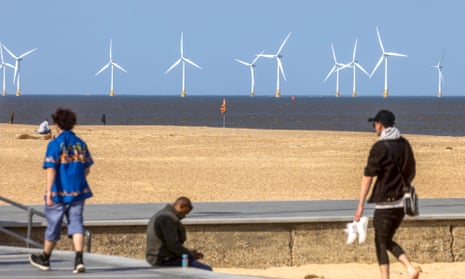Last week’s announcement that the government would delay key net-zero targets came as a surprise to anyone who has followed the policy. The existing targets were fair and well considered, and enjoyed wide political support. It’s strange to cite our world-leading progress in reducing emissions and developing low-carbon technologies, then decide that is a reason for slowing down, especially when doing so risks surrendering that position and those investment opportunities to other countries.
Make no mistake, the government cannot stop our collective progress towards net zero. But it can, all too easily, slow progress at a critical time when we should be accelerating our efforts. Businesses and innovators are in a global race to create and deploy the technologies that will help us get there, and with a lack of clear political commitment Britain is lagging in some areas. Up until recently, Britain was the global leader in offshore wind power. It is now China.
As my amendments to the energy bill suggested, enshrining the 2035 target in law will guarantee practical policy for the next 12 years, and also provide a new legal mechanism to hold whoever is in government to account for its delivery. This is more essential than ever as we head towards a general election: we cannot afford for net zero to become a political casualty.
Integral to hitting net zero by 2050 is electricity decarbonisation by 2035. This is a seminal milestone in Britain’s net-zero journey, and decarbonising grid and infrastructure was identified as the most critical area in the Mission Zero independent review of net zero. It holds the key to forging successful decarbonisation pathways for the trio of essential industries – transport, housing and heating – which have been recently subject to increased uncertainty given the announced policy changes.
The UK must now double down on its commitment to achieving a clean grid by 2035 – or risk breaking its net zero by 2050 pledge. Put simply, we cannot view these timelines, informed by expertise from top climate scientists and the Climate Change Committee, as malleable to political whim. They are gradated, clear pathways that must not be tampered with at this stage of innovation and investment as we transform our economy.
The rhetoric that the net-zero transition is at odds with the economy is false. There is the obvious fact that it will cost Britain dearly if it fails to attract international investment as a centre for sustainable finance – something I term the “cost of not-zero”. And it was only this time last year that Britain was headed towards a winter in which fuel poverty reached record levels and some households were choosing between heating their homes or putting food on the table. The energy transition would help address this.
Volatile international gas markets have fuelled the cost of living crisis in the UK, due to 80% of our home heating being reliant on gas. Clean energy provides not only a key means to Britain achieving net zero within the timeline we’ve committed to, but also offers households a vital financial lifeline through decreasing the price of energy. Domestically produced, cheap, clean energy will not be subject to the same price shocks we saw with gas – making sure the energy crisis was truly a once in a generation occurrence.
As we have seen in the past year with grid connection issues, a net-zero electricity system is complex and dependent on systemic upgrades. To truly ensure the end result is fit for purpose, we must consult with the industry bodies that know it best – be it those associated with nuclear, solar, wind or the grid itself, as well as those within their respective supply chains. Which is why, as part of the Mission Zero Coalition I announced in March this year, we will be launching a power generation network to take forward an ambitious programme of recommendations to the government to support the decarbonisation of the UK’s power infrastructure.
The purpose of this coalition is to ensure the gaps in public policy are filled to enable Britain to receive the economic rewards from this global race to net zero. We exist to support Britain on its path, most pressingly by contributing ideas that aid the design and delivery of a genuinely secure and sustainable energy mix. It will be my undertaking, beyond my role as an MP, to act as steward.
As I set out in the net-zero review, the climate crisis is the greatest challenge of our generation, but it is also the greatest economic opportunity. There is now no future economy without a green economy, and the UK must continue to seize the net-zero opportunity with both hands, not drop our greatest chance for growth this century.
Chris Skidmore is Conservative MP for Kingswood, the former energy minister who signed net zero into law, and chair of the Mission Zero independent review of net zero

